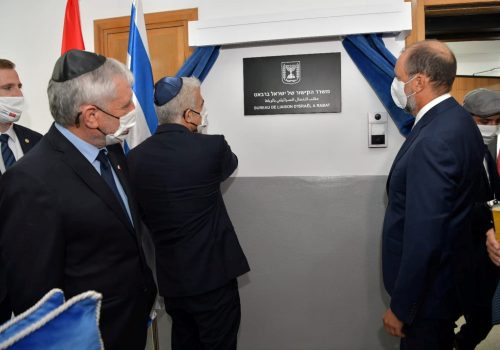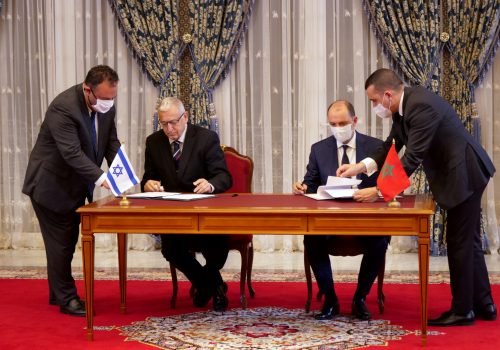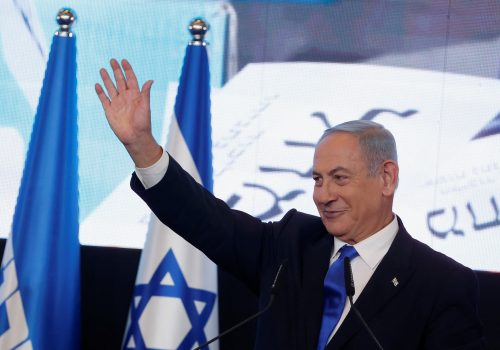Morocco is building bridges to connect its youth with its Moroccan Jewish cultural heritage. Here’s how.

Morocco has been a vibrant center of Jewish life for millennia—a history that the country still honors in its daily relationships and embrace of different religions and ways of life. Before the creation of the State of Israel in 1948, the Jewish population in Morocco reached almost three hundred thousand people. It was the biggest non-Ashkenazi community in the world and the largest Jewish community in the Muslim world.
Today, the Jewish community living in Morocco does not exceed three thousand members. However, the Moroccan Jewish community remains the largest in the Arab world. For example, in the coastal city of Casablanca, there are twenty active synagogues, seven kosher restaurants, five kosher butchers, and four Jewish schools.
Since 1997, the Foundation of Moroccan Jewish Heritage has preserved dozens of synagogues around Morocco and, in 1997, created the only Jewish museum in the Arab world, in Casablanca. With the full support of the Moroccan Monarchy, local Jewish communities have preserved more than 167 Jewish cemeteries and shrines throughout the Kingdom.
In 2020, in the port city of Essaouira, King Mohammed VI inaugurated Bayt Dakira (The House of Memory), a center dedicated to the historic Convivencia between Jews and Muslims in Morocco. Furthermore, to support the preservation of Moroccan Jewish cultural heritage, the king launched a conservation plan for the former Jewish quarters of several cities. This plan has included the rehabilitation and renovation of Jewish sites, as well as the restoration of Jewish names to the streets of the quarters.
Morocco’s paradigm shift
In the last twenty years, Morocco has experienced a paradigm shift in regard to the perception of pluralism and diversity. In the past, diversity was considered a threat that needed to be denied and diminished. Now, diversity is celebrated and recognized as beneficial to building a better future for the Moroccan people. This was visible in the integration of Judeo-Moroccan history into the Moroccan school curriculum.
The Abraham Accords have offered a new opportunity to strengthen the ties that bind Morocco to its Jewish community in the Diaspora, especially in Israel.
With the resumption of bilateral relations between Morocco and Israel in 2020, relations went far beyond economic or diplomatic concerns. Both countries share deep historical and cultural ties, thus, creating an exceptional bond, which offers promising opportunities for cooperation and presents the Middle East with unique and new opportunities for positive change and growth.
Israel and Morocco share what is impossible to develop out of nothing: the link between the two states through history, culture, and people. Together, they have a shared cultural heritage, a sizable community of Israelis of Moroccan descent, and the largest Jewish community in the Arab world, with about three thousand Moroccan citizens of Jewish faith. This human underpinning of the two nations’ bilateral relations, rebuilt in 2020, is arguably the least replicable if lost, and will, if preserved, represent a significant competitive advantage in the growth of bilateral relations between the two countries.
This connection lies in a community of eight hundred thousand Israelis originally from Morocco. Israeli natives whose grandparents migrated to Israel are eager to reconnect with their Moroccan origins, history, and culture. Since 2020, initiatives have been launched in Morocco with the aim of maintaining the transmission of Moroccan Jewish heritage and strengthening the relationships between Israelis and Moroccans. The relations between academia and civil society are essential to building sustainable bridges among them.
Aware of this issue, the Education Ministry (which recently introduced the history of the Jewish presence in Morocco into the educational system), Bayt Dakira, the Foundation for Judeo-Moroccan Heritage, and various civil society initiatives have been among the projects to preserve this heritage.
To maintain the connection between Jews of Moroccan descent and their nation of origin, these activities establish the foundation for the cultural bridge that will be built. However, they must be encouraged to continue to succeed. Support for these initiatives is based on educational and cultural exchanges that unite people, allow for the country’s riches to be made accessible to younger generations, uphold the tradition of passing down the Judeo-Moroccan heritage, and increase the potential for economic cooperation between parties.
New Moroccan Convivencia
Today, intellectual exchanges between the two nations serve as a powerful engine and a revealing indicator of the expansion and strengthening of bilateral cooperation, as evident by the seven agreements the Mohammed VI Polytechnic University (UM6P) has made with Israeli institutions of higher education since 2021. These agreements welcome the exchange of people and ideas, and Moroccan universities excitedly anticipate the arrival of Israeli students, visiting scholars, and faculty.
UM6P is an institution oriented towards applied research and innovation. It has also become the center of the new Moroccan Convivencia, a celebration and embrace of the best of the past as the basis for a bright future of shared societies. On October 31, 2022, the first campus synagogue in the Arab world opened its doors at the Mohammed VI Polytechnic University in Benguerir. The Temple, known as Beit Allah in Arabic and Beit El Synagogue in Hebrew, was inaugurated as a result of the great efforts made by Morocco to preserve the country’s rich Jewish heritage.
Members of the Moroccan Jewish community, civil society, representatives of Jewish communities of Egypt and the United Arab Emirates (UAE), as well as a group of students from different Moroccan schools and universities, gathered at the entrance of the synagogue to witness the installation of the Mezuzah on the threshold of this house of worship.
Despite its small size, the synagogue will serve as a gathering space for Jewish men and women, professors, students, and even visitors who will practice their religious traditions within a Moroccan-styled synagogue. However, one must not overlook the objective side, which is the role of the synagogue as a space of dialogue among religions, faiths, and philosophies. Opening a synagogue that shares its walls with the campus mosque will help university students reconnect with Morocco’s historical Jewish presence, which is embedded in the country’s identity.
Considering its cultural aspect, the synagogue can also serve as a meeting point for the growing number of Muslim students inside the Mohammed VI Polytechnic University who are interested in celebrating Morocco’s diversity and increasing their understanding of Moroccan Jewish identity. The campus synagogue can hold Jewish celebrations, such as the lighting of the candles of Hanukkah or celebrating the Mimouna, a Jewish-Muslim Moroccan holiday that symbolizes togetherness and cohabitation at the end of the Passover holiday.
In a region where synagogues are being torn down, Jews are demonized, and religious, cultural, and lingual diversity are considered threats, Morocco’s continuation of decades-long efforts to safeguard the Moroccan Jewish heritage is integral to combating extremism and hatred and fostering interreligious dialogue.
El Mehdi Boudra is a nonresident senior fellow at the Atlantic Council’s Middle East Programs. Follow him on Twitter: @ElBoudra.

The N7 Initiative, a partnership between the Atlantic Council and the Jeffrey M. Talpins Foundation, seeks to broaden and deepen normalization between Israel and Arab and Muslim countries. It works with governments to produce actionable recommendations to deliver tangible benefits to their people.
Further reading
Thu, Oct 7, 2021
Morocco and Israel are friendlier than ever thanks to the Abraham Accords. But what does this mean for the rest of North Africa?
MENASource By Karim Mezran, Alissa Pavia
The agreement between Israel and Morocco sparked a series of chain events in neighboring North African countries that will likely have lasting consequences on the economic, security, and socio-political relations in the region.
Thu, Dec 24, 2020
How Moroccans reacted to normalization with Israel
MENASource By
Moroccans were not surprised to see their country became the fourth Arab nation to normalize relations with Israel—it was the US’s recognition of Western Sahara that astonished them since Morocco’s identity is intertwined with that of Western Sahara.
Wed, Nov 2, 2022
Experts react: Bibi is back—back again for now
MENASource By Daniel B. Shapiro, Barbara Slavin, Mark N. Katz, Richard LeBaron, Thomas S. Warrick, Jean-Loup Samaan, Shalom Lipner, Carmiel Arbit, Ali Bakir, David Daoud, Andrew L. Peek, Ariel Ezrahi, Yulia Shalomov, Jonah Fisher
We asked our experts to weigh in on what's in store for Israel's democracy, its ability to balance opposing domestic forces, and its relations with regional partners.
Image: A Moroccan Jewish man prays at a synagogue in Tetouan, March 16, 2008. More than 100 Moroccan Jews celebrated the Hailoula ceremony in honor of saint rabbi Itshak Benoualid. REUTERS/Rafael Marchante


